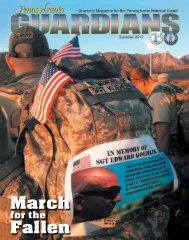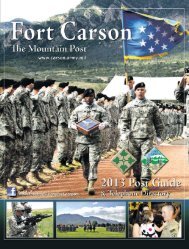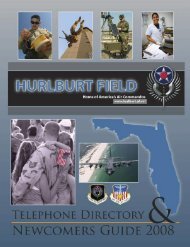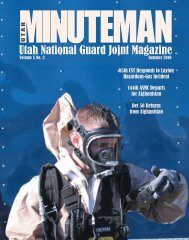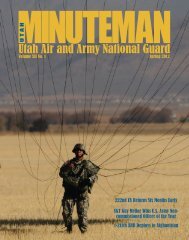New Hampshire National Guard Magazine - Fall 2011
New Hampshire National Guard Magazine - Fall 2011
New Hampshire National Guard Magazine - Fall 2011
Create successful ePaper yourself
Turn your PDF publications into a flip-book with our unique Google optimized e-Paper software.
Pfc. Ryan Sandlin, center, stands with his parents, Linda and Rod Sandlin, at their house in Bow, on July 22.<br />
Sandlin was diagnosed with cavernous sinus thrombosis: a clot within the sinus cavity at the base of the<br />
brain, which drains deoxygenated blood from the brain back to the heart. He and his family returned home<br />
July 14 from Fort Gordon, Ga., where he was receiving medical treatment. Now he will continue his<br />
physical rehabilitation at the Veterans Affairs hospital in Manchester. Photo by Spc. Courtney Selig<br />
By Spc. Courtney Selig, NHNG Public Affairs Office<br />
On March 12, 2009, Pfc. Ryan Sandlin,<br />
C Company, 3/172nd Infantry (Mountain),<br />
was at Fort Benning, Ga., attending Basic<br />
Combat Training. He went on sick call for<br />
headaches. The doctor’s first diagnosis<br />
was meningitis. However, two days later<br />
he was diagnosed with cavernous sinus<br />
thrombosis – a clot within the sinus cavity<br />
at the base of the brain, which drains<br />
deoxygenated blood from the brain back<br />
to the heart. Sandlin was medically evacuated<br />
to Fort Gordon, Ga., and given a<br />
50 percent chance of survival.<br />
Since then he has survived, not just<br />
one, but two strokes. Doctors said that a<br />
staph infection caused a blood clot in the<br />
brain, leading to one stroke, followed by<br />
a second. Sandlin’s case is one of only<br />
about 100 cases ever recorded where this<br />
has happened.<br />
The Sandlin family was notified<br />
immediately and were flown down to see<br />
their son in Georgia, where they stuck by<br />
his side for approximately two years.<br />
“We have been very fortunate<br />
because since the phone call, they (the U.S.<br />
Army) have taken great care of us,” said<br />
Rod Sandlin, Ryan’s father. “The Army<br />
put us up in the Fisher House, which is<br />
next to the hospital, and we’ve been here<br />
for the past two years watching our son<br />
recover.”<br />
The Sandlin family was able to stay at<br />
the Fisher House on Fort Gordon, which<br />
is a program whose mission is to provide<br />
temporary lodging in a kind, caring and<br />
home-away-from-home environment to<br />
members of the armed services, veterans<br />
and their families during a medical<br />
crisis.<br />
“The people are so nice,” said Linda<br />
Sandlin, Ryan’s mother. “They make you<br />
feel at home when really you’re a thousand<br />
miles away.”<br />
“Having other soldiers there is like having a second backbone –<br />
they pick you up, and you pick them up<br />
when it seems a little harder than the day before.”<br />
– Pfc. Ryan Sandlin<br />
Ryan agreed. He said that living in an<br />
environment like the one at Fort Gordon<br />
helped him with his recovery.<br />
Sandlin’s therapy was at the Dwight<br />
D. Eisenhower Army Medical Center at<br />
Fort Gordon, one of the few active duty<br />
wards still operating in the VA system.<br />
There, he was able to go through treatment<br />
with other soldiers, many of them<br />
combat veterans, and still spend time<br />
with his family.<br />
“You wake up every day in the same<br />
room as someone who has a lot of work<br />
ahead of them, too,” said Sandlin. “Having<br />
other soldiers there is like having a<br />
second backbone – they pick you up, and<br />
you pick them up when it seems a little<br />
harder than the day before.”<br />
While he was making his recovery,<br />
several members of the <strong>New</strong> <strong>Hampshire</strong><br />
<strong>National</strong> <strong>Guard</strong> went to Fort Gordon<br />
to visit him.<br />
“It was really awesome having soldiers,<br />
like Command Sgt. Maj. Nanof, come<br />
and visit,” he said. “You feel like people<br />
back home really care, and you know they<br />
haven’t forgotten about you.”<br />
Today, Sandlin is doing very well and<br />
making a remarkable recovery.<br />
“When he got out of the hospital<br />
originally, doctors thought he would be<br />
bedridden for the rest of his life,” said<br />
Rod Sandlin. “Now, he can talk, bathe,<br />
walk and dress himself.”<br />
July 14 was the Sandlin family’s last<br />
day at the medical facility in Georgia. They<br />
flew in to Manchester-Boston Regional<br />
Airport at midnight July 15.<br />
Sandlin’s father said that Ryan has<br />
made quite the recovery, and he’s come<br />
a long way, but he still has a long way<br />
to go.<br />
“He’s got a long road ahead, but he’s<br />
been in good spirits throughout this<br />
process, and he’s willing to work harder –<br />
he wants to live on his own,” said Rod<br />
Sandlin. “He wants to work harder than<br />
he’s ever worked for his recovery.” ❖<br />
<strong>Fall</strong> <strong>2011</strong> / <strong>New</strong> <strong>Hampshire</strong> <strong>National</strong> <strong>Guard</strong> <strong>Magazine</strong> 9



